Table of Contents
Love them or hate them, electric scooters are here to stay. From Madrid to Rome, the e-scooter has become a popular mode of transport in 2021. Quick, convenient and environmentally friendly, it’s the lightest and most fuss-free way to travel from A to B, with no need to cram into trains or pay expensive Uber fares.
The electric scooter is a breath of fresh air for UK city dwellers as it makes it easier for commuters to social distance on their way to work.
However, the government is still running a trial to assess the positive and negative effects of e-scooters on public roads. So, before you decide to buy one or hire one on the latest smartphone app, here is an updated guide to the current UK electric scooter law, released by the Department of Transport in 2021.
Please take note that the government’s laws and regulations for the electric scooter rental scheme are different from the laws that govern privately owned scooters. To help keep you informed all of the rules and regulations for both rental and privately owned scooters are outlined in this article.
A guide to rental e-scooter laws in the UK
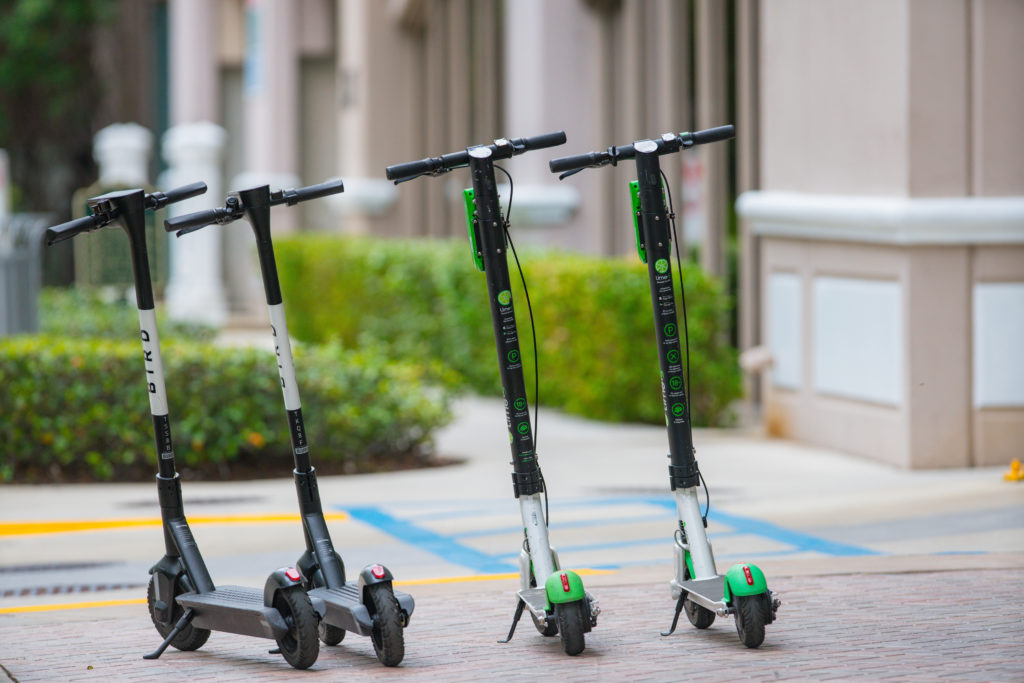
Are electric scooters legal in the UK in 2021?
Yes, rental e-scooters are legal, however, it is important to note that private e-scooters are not legal, unless used on private land. You could receive a fine for using a private scooter on a public road or pavement.
The maximum speed for an e-scooter is 15.5mph and in some areas, it is limited to a lower speed. As part of the trial, technology has been utilised to create “go-slow areas” where the speed is reduced for safety purposes.
A Privately owned e-scooter can reach up to 68 mph (110 km/h) but ones hired as part of the rental scheme in the UK have a maximum limit of 15.5mph (24.9km/h).
Do you need a driving licence for a rental e-scooter?
Yes, an e-scooter is classified as a powered transporter, so it falls under the same law as cars.
The government is currently running rental trials. Below are the rules for members of the general public who are using rental e-scooters as part of the rental trials.
You must have the category Q entitlement on your driving licence to use an e-scooter. A full or provisional UK licence for categories AM, A or B includes entitlement for category Q. If you have one of these driving licences, you can use a rental electric scooter.
If you have a provisional licence, you do not need to show L plates when using an electric scooter.
If you have an overseas driving licence, you can use an electric scooter if you:
- Have a valid full licence from an EU or European Economic Area (EEA) country (so long as this does not prohibit you from driving low-speed mopeds and motorcycles).
- Have a valid full licence from another country that entitles you to drive a small vehicle (for example, cars, mopeds or motorcycles) and you entered the UK within the last 12 months.
E-scooters also need motor insurance, but you do not need to organise this as it will be provided by your electric scooter rental operator.
It is also important to note that even if you have a licence you still have to complete a quick online course before you can hire a scooter and you have to be over 18 years old.
For more information on driving licence requirements visit the GOV.UK site for guidance for users.
Where exactly can I ride a rental electric scooter?
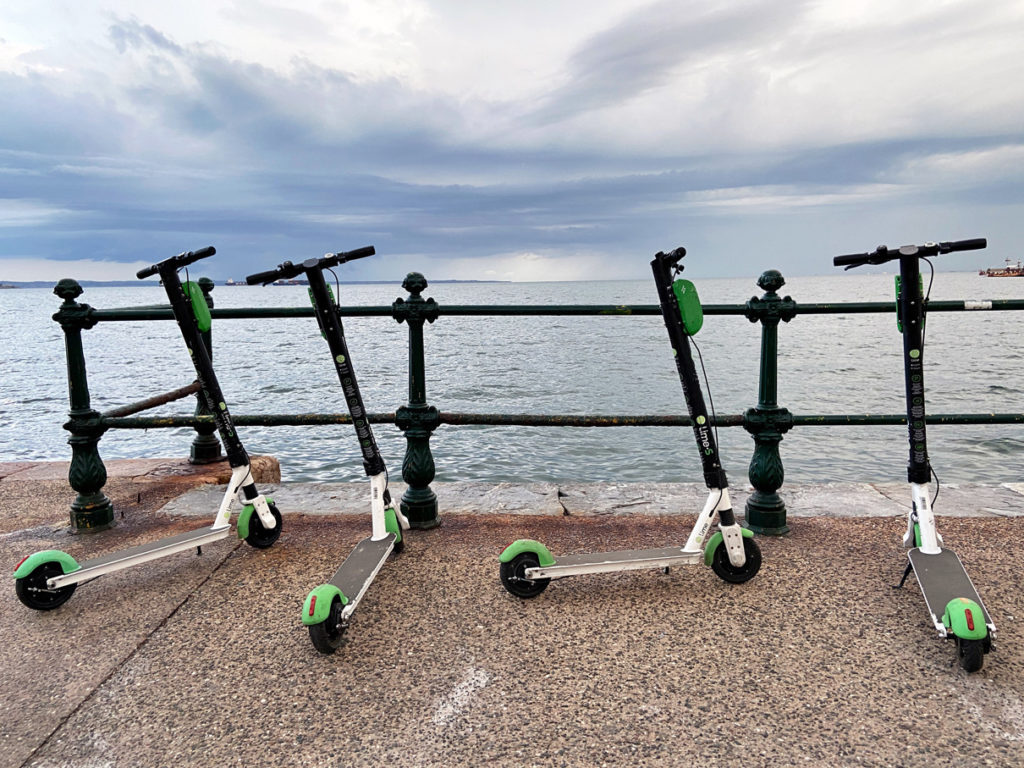
Firstly, e-scooters should only be used in the local areas hosting the trial rental schemes.
Secondly, you may use a trial scooter on the road, but not on motorways and in cycle lanes, and definitely not on the pavement, if you do so you could face a hefty fine.
According to the road traffic act a pavement is classified as part of the public highway, which is why it’s illegal to ride your rental scooter there.
The good news is you can ride your private scooter on privately owned land and enjoy the great outdoors, as long as the land is not open to the public and you have the landowner’s permission.
There are rental trials in operation across the UK as of 2021.
Benefits of the Rental Scheme
![]() More ECO-Friendly
More ECO-Friendly
![]() Shows how effective PEVs can be
Shows how effective PEVs can be
![]() Quick and easy to use
Quick and easy to use
![]() Insurance already supplied
Insurance already supplied
![]() Numerous scooters available
Numerous scooters available
Cons of the Rental Scheme
![]() Unfair on Private Owners / Private Ownership
Unfair on Private Owners / Private Ownership
![]() Governments Less Likely to Legalise Private Scooters
Governments Less Likely to Legalise Private Scooters
![]() Scooters are generally slow
Scooters are generally slow
![]() Expensive for short journies
Expensive for short journies
![]() Still used irresponsibly by some riders
Still used irresponsibly by some riders
![]() Rental firms more likely to lobby against legalisation
Rental firms more likely to lobby against legalisation
Should I Wear a Helmet?

You should wear a helmet while driving a rental scooter, however, helmets are only recommended and are not a legal requirement.
Make sure that your cycle helmet conforms to regulations, is the correct size and is securely fastened.
Light-coloured or fluorescent clothing is also recommended so that other road users can see you in poor light or the dark.
Because rental scooters are legally limited to 15mph, most cycle helmets will offer sufficient protection.
Travelling beyond 20mph should warrant the switch to a motorcycle helmet to provide adequate protection for higher speed impacts.
Wearing a helmet is recommended. Even an impact at 15mph can cause significant brain injury.
Be Aware of Prosecution and Fines
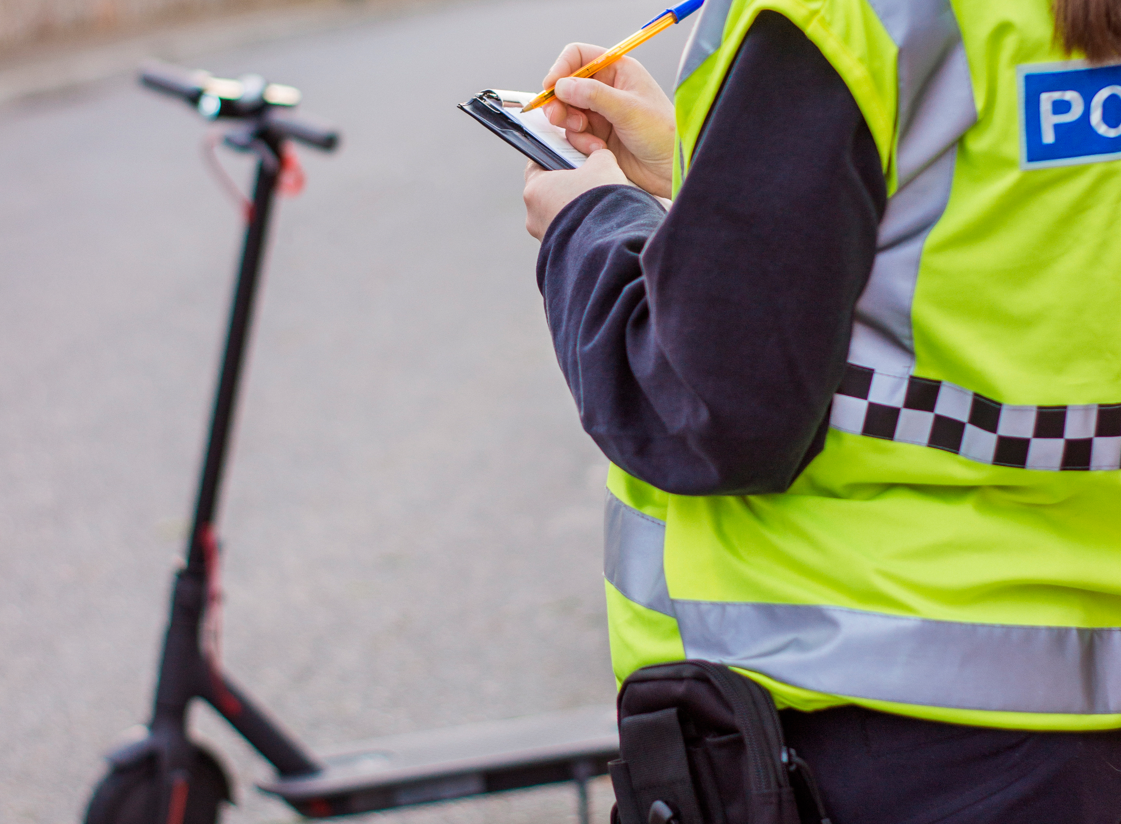
The Met Police can issue fines for riding on the footway and will hand out fines and driving licence penalty points for using a phone or riding through a red light. You can find more detailed information about fines on the Met Police advice on using the e-scooters page.
Offences can include:
- Riding on the footway: Fixed Penalty Notice and possible £50 fine
- Using a mobile phone: £100 and six penalty points
- Riding through red lights: Fixed Penalty Notice, £100 fine and possible penalty points
- Drink driving offences: As with driving cars; court-imposed fines, driving ban and possible imprisonment
If you are using an e-scooter in public in an anti-social manner, you can also risk it being seized under section 59 of the Police Reform Act.
Riding dangerously or without due care or attention can land you in trouble!
Everything you need to know about the electric scooter trial rental scheme
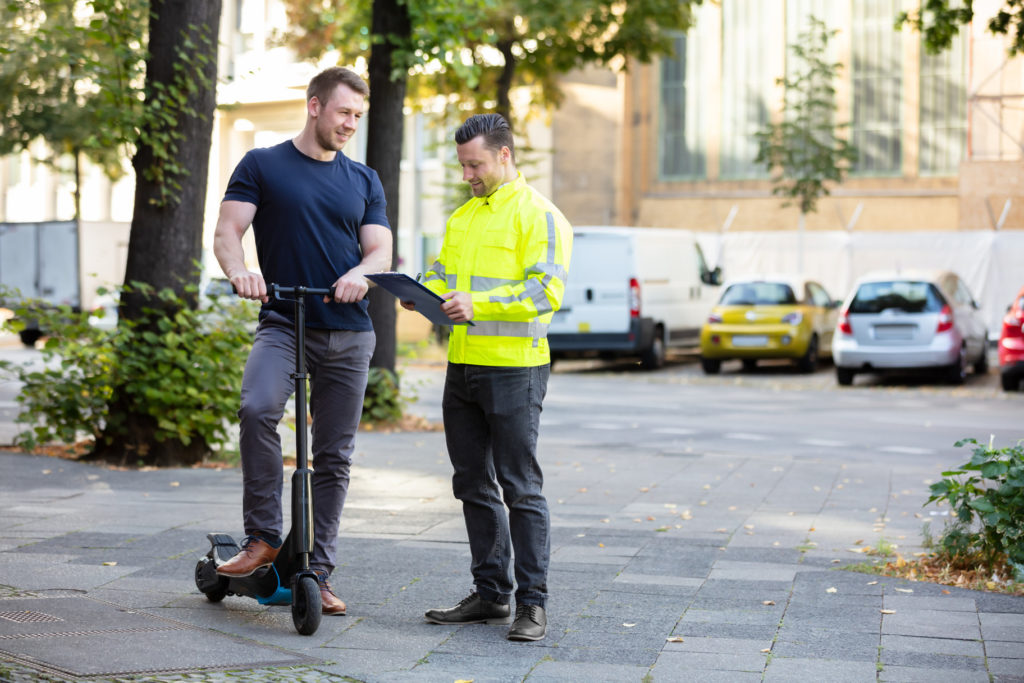
On 4 July 2020, the UK government released new laws and regulations regarding e-scooters in the UK. The trial rental scheme was first planned for 2021, but a decision was made to bring the trial forward in response to the COVID-19 pandemic and with the hope that it would deliver a green restart to local transport in the UK. However, this trial is only being carried out in certain areas. The Department for Transport is constantly reviewing the regulations that apply to e-scooters as part of its Future of Transport programme.
The Department for Transport hopes that the trials will help to understand whether e-scooters can reduce motor traffic in the UK and be efficiently integrated into existing transport networks, as well as assess their safety for riders, pedestrians and other road users.
“E-scooters may offer the potential for convenient, clean and cost-effective travel that also help ease the burden on the transport network, provide another green alternative to get around and allow for social distancing,” said Transport Minister Rachel Maclean.
In July 2020, the UK Government released new laws/legislation around electric scooters in the UK.
The Department of Transport legally defines e-scooters as having the following features:
- Is designed to carry no more than one person
- Is fitted with no motor other than an electric motor with a maximum continuous power rating of 500W and is not fitted with pedals that are capable of propelling the vehicle
- Has a maximum speed not exceeding 15.5mph
- Has two wheels, one front and one rear, aligned along the direction of travel
- Has a mass including the battery, but excluding the rider, not exceeding 55kg
- Has means of directional control via the use of handlebars that are mechanically linked to the steered wheel
- Has means of controlling the speed via hand controls and power control that defaults to the off position
The London E-Scooter Trials
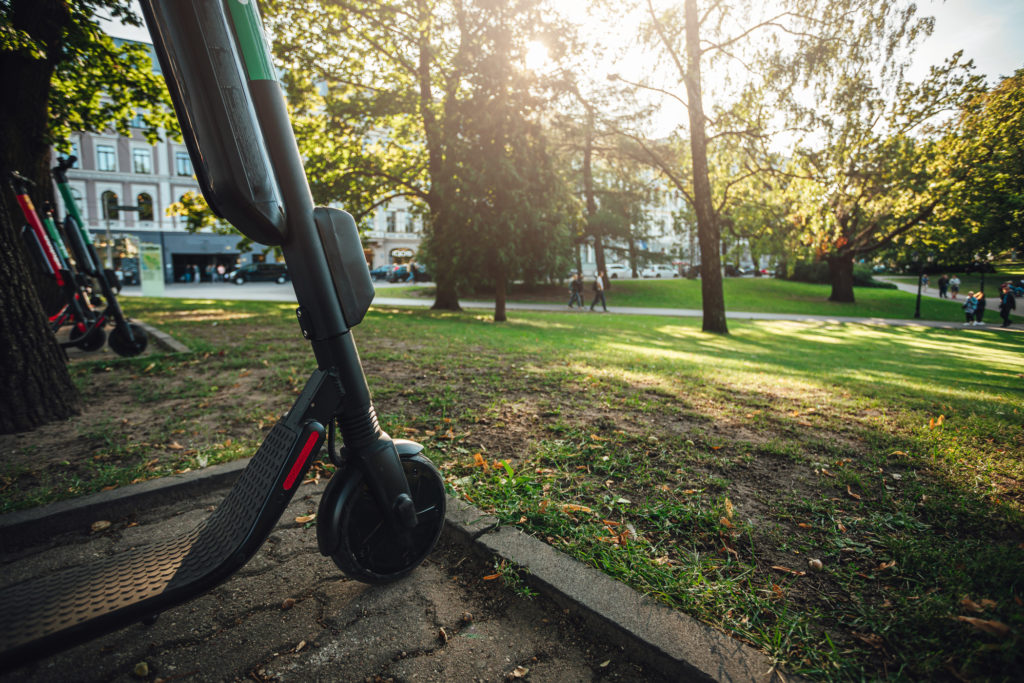
On 7 June 2021, electric scooters became available to rent in some selected London boroughs. This is the only way to legally ride e-scooters on public roads or in other public places in London.
The Department of Transport is running the trial with London Councils and the participating London boroughs, plus Canary Wharf. Working together on a single trial means the trial can run consistently across participating boroughs.
The London rental e-scooters will be provided by three different operators:
- Dott
- Lime
- TIER
The operators were chosen after an open and competitive process to assess their ability to meet strict safety requirements and high operating standards. Dot, Lime and TIER e-scooters are now available for hire in:
- City of London
- Ealing
- Hammersmith & Fulham
- Kensington and Chelsea
- Lambeth (north of the borough only)
- Richmond upon Thames
- Southwark
- Tower Hamlets (limited parking at Canary Wharf and some TfL stations)
- Westminster
More areas are expected to join in the future.
Will Norman, London’s Walking & Cycling Commissioner, said: “E-scooters have been on our streets for some time now but with very little regulation. This trial has safety at its heart, bringing in rigorous precautions and parking measures while taking the needs of all road users into account and seeing what role e-scooters can play in London’s future. As we look to our capital’s future, we want to ensure a green and sustainable recovery from the pandemic.”
Government Rules for Privately Owned E-Scooters

E-scooters are legally classified as ‘Powered transporters’ which is a term used to cover a variety of novel and emerging personal transport devices which are powered by a motor.
Given how powered transporters are motorised and designed, they fall within the legal definition of a ‘motor vehicle’. Therefore the laws that apply to vehicles apply to powered transporters.
It is illegal to use a powered transporter:
- On a public road without complying with a number of legal requirements, which potential users will find very difficult
- In spaces that are set aside for use by pedestrians, cyclists, and horse-riders; this includes on the pavement and in cycle lanes
Any person who uses a powered transporter on a public road or other prohibited space in breach of the law is committing a criminal offence and can be prosecuted.
What law applies to the use of private e-scooters?
Under current law, there is no special legal regime for powered transporters. This means that they are covered by the same laws and regulations as cars.
The definition of ‘motor vehicle’ as set out in the Road Traffic Act 1988 is “any mechanically propelled vehicle intended or adapted for use on roads”. There is case law confirming that powered transporters fall within this definition.
Where can you legally use private e-scooters?
Legal Use
![]() Private Land
Private Land
Illegal Use
![]() Any Roads
Any Roads
![]() Any Paths or Byways
Any Paths or Byways
![]() In Town Centres
In Town Centres
![]() Car Parks (unless the landowner has given permission)
Car Parks (unless the landowner has given permission)
Private land, yes
You can use powered transporters on private land to which the public does not have access without legal restrictions. The permission of the owner or occupier of the land must be obtained.
Not Pavements
It is an offence to use powered transporters on the pavement. By section 72, Highway Act 1835 it is an offence to ride on or to lead or draw a carriage on a pavement. This rule applies to almost all vehicles, with special legal exceptions for mobility scooters and wheelchairs.
Not Footpaths
In addition, powered transporters are forbidden from using footpaths. A footpath is a public right of way over land which may only be used on foot. Mechanically propelled vehicles are forbidden from using footpaths by section 34 Road Traffic Act 1988.
Not Cycle tracks
Powered transporters are prohibited from using cycle tracks, cycle lanes on roads, or other spaces dedicated to pedal cycle use only (section 21(1), Road Traffic Act 1988). EAPCs and mobility scooters are exempt from this ban.
In addition, powered transporters cannot be used on bridleways or restricted byways (section 34, Road Traffic Act 1988).
Using an E Scooter on Public Roads
When it comes to public roads – they must meet a number of different requirements. These include insurance; conformity with technical standards and standards of use; payment of vehicle tax, licensing, and registration; driver testing and licensing; and the use of relevant safety equipment.
If the user of a powered transporter could meet these requirements, it might in principle be lawful for them to use public roads. However, it is likely that they will find it very difficult to comply with all of these requirements, meaning that it would be a criminal offence to use them on the road.
Other spaces
Some of the same restrictions set out above apply to other spaces which are nevertheless accessible to the public, such as car parks, public squares which are not restricted to pedestrian use, privately-owned roads, industrial estates, and university campuses.
There are no statutory restrictions on the use of powered transporters on land which is not accessible to the public. The permission of the owner and/or occupier of the land will be required.
Can I be prosecuted for using a private e-scooter?
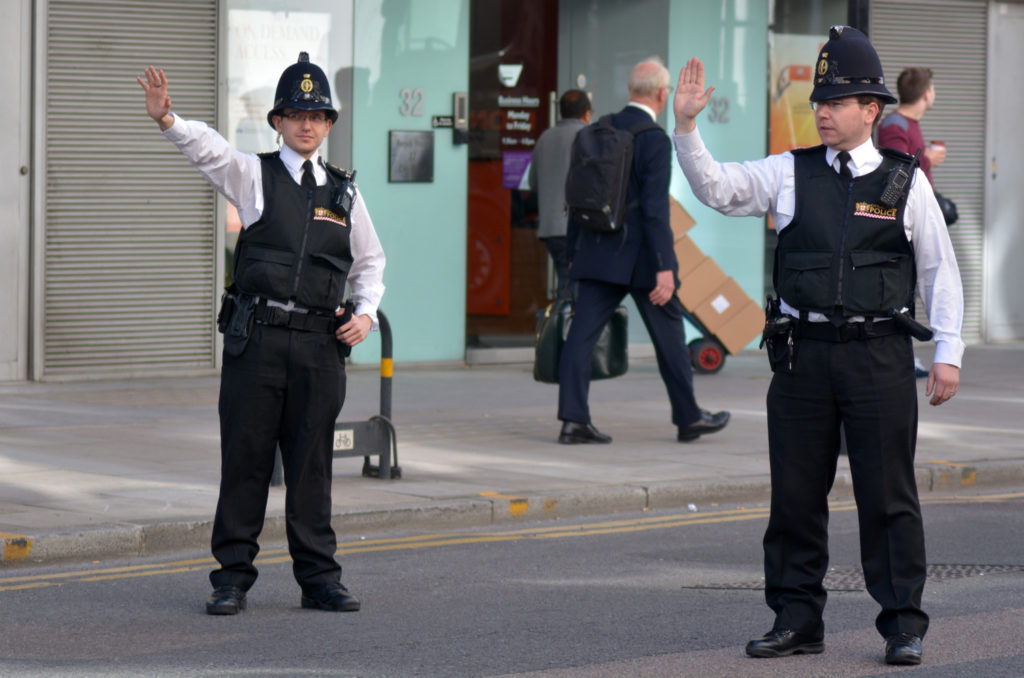
Breaches of the law relating to vehicles are generally criminal offences. Local police forces enforce the law, and, together with the CPS where relevant, are responsible for prosecuting offenders.
The potential penalties depending on the nature and gravity of the offence, and sentences range from fines and penalty points to disqualification from driving. Those who use them dangerously or under the influence of drink or drugs can also be convicted of offences leading to imprisonment. Offences related to the standard of driving and speeding also apply.
The E Scooter Laws in the UK are Ridiculous and outdated.
Can I get insurance for my electric scooter?
Because they are classified as motor vehicles, they must comply with various pieces of Road Traffic Legislation, including:
- driving with a licence
- driving/riding with insurance
- driving/riding other than on a road
- need to be taxed
However, It is not currently possible to get appropriate insurance for privately owned e-scooters, meaning it is illegal to use them on the road or in public spaces.
Insurance brokers don’t provide electric scooter insurance yet, they have to wait for the law to change. Because e-scooters are technically classed as motor vehicles they are subject to insurance and MOT, however, they cannot be insured yet and therefore there is no mechanism for legal use at the moment.
Electric scooter liability insurance will cover the rider financially in the event they injure a pedestrian or damage somebody’s property.
Riding an electric scooter on UK roads is illegal if it is not registered, and the rider doesn’t have an appropriate licence and insurance. The Government is working to put legislation through which changes this and makes it legal to ride scooters on public roads, with similar regulations to electric bicycles.
Just like a bicycle or e-bike, e-scooters pose a very small risk to other road users compared to a car or van. As a result, it is unlikely the government will make electric scooter insurance mandatory.
Will private scooters become fully legal in the UK after the trial?
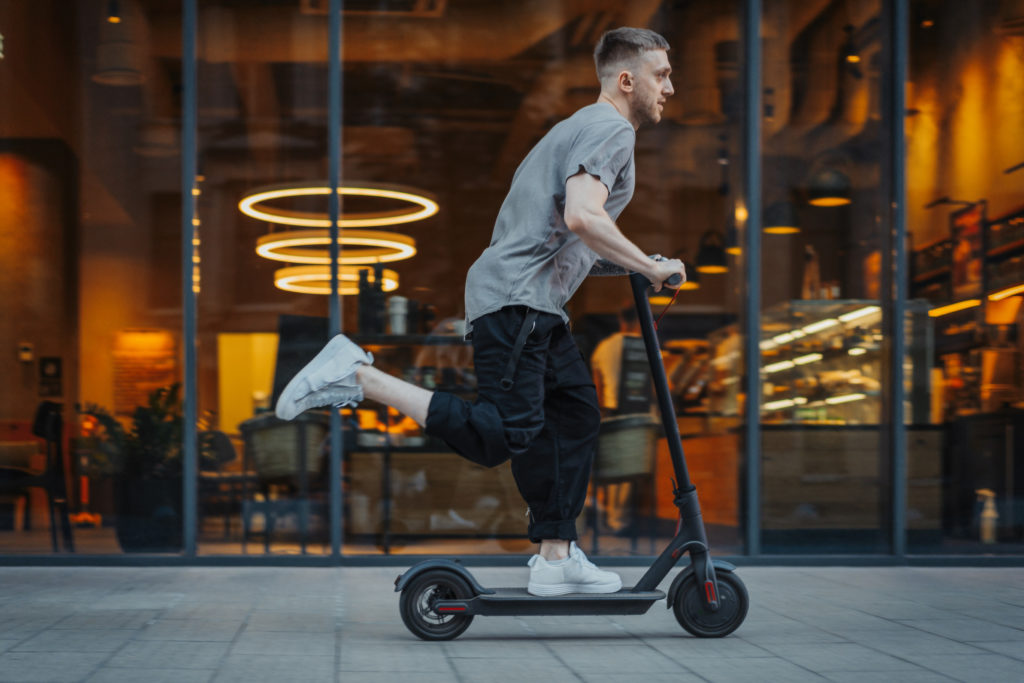
Yes, eventually. Making e-scooters legal has been on the UK government’s agenda for some time. The trial and its impact will give the UK government time to amend legislation. Trials in cycling networks and e-scooters are part of a strategy for more efficient transport in towns and cities, offering cost-effective travel that can alleviate the burden on the transport network and provide more eco-friendly alternatives.
Although we need to keep an eye to see whether the government decides to U-TURN or whether private rental firms lobby against legalisation (to maintain a monopoly over the scooter market).
We’re hoping that after the trials finish, scooters will be legalised and classed the same as mopeds.
When exactly will private scooters become fully legalised?
The government has come under pressure to properly regulate the use of electric scooters and it was revealed that reaching a decision on their legality could take up to a year.
A decision on the use of the devices, which have been trialled in 50 cities across the UK, is reportedly unlikely to be made until they have been tested in London, and the rollout trial in the capital has faced delays.
Trials were expected to finish in August 2021, but ministers have now revealed that they will continue until March 2022, meaning that a decision regarding whether or not to permit their use will not be made until next year. Legislation, therefore, may not come into effect until 2023.
The Department for Transport has said: “To ensure we get the most comprehensive evidence from trials, including those that have started more recently, the end date for trials has been extended to 31 March 2022.”
Have Private E Scooters Been Kept Illegal for Use on Public Land Because they are Dangerous?
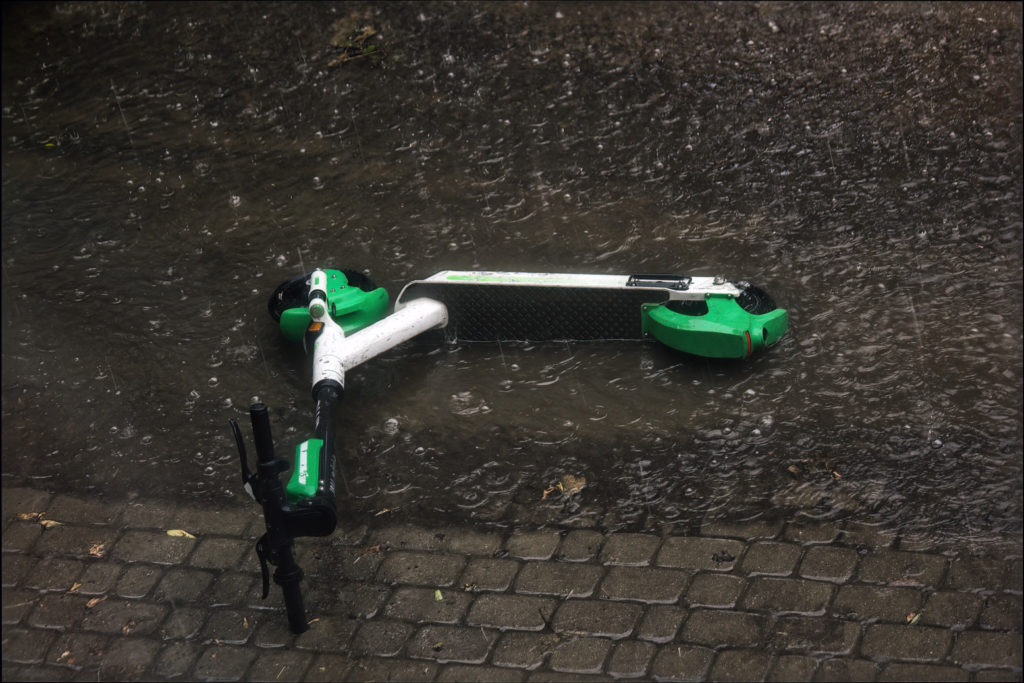
The simple answer is no, if you stick to the laws and safety guides they are perfectly safe.
However, the exact number of crashes involving e-scooters is said to be under-reported. There have been a few fatalities due to negligent drivers on the road and police officers have seized around 800 electric scooters in 2021. In London, there has been a growing list of incidents involving e-scooters and at least four people in the UK have died in electric scooter crashes.
There are also reports from around the country of pedestrians being struck and injured, sometimes seriously by e-scooter riders and the National Federation of the Blind has warned that the near-silent vehicles are treacherous for visually impaired people.
The exact number of crashes and injuries associated with e-scooters is unclear. According to ITV’s Tonight programme, there have been 1,100 complaints and 210 people have suffered injuries since the beginning of the trials.
Riders face a £300 fine and points on any current or future driver’s licence. Intoxicated riders are being prosecuted under drink-driving laws.
Most Electric Scooter Accidents Are Caused By Irresponsible Riders. In General, Electric Scooters Are A Safe Form Of Transportation.
Why are electric bikes fully legal and electric scooters not?
Electric bikes are categorised as EAPC’s (Electrically-assisted pedal cycles), which means that they have specific laws governing them. You do not need a licence to ride one and it does not need to be registered, taxed or insured.
However, privately-owned e-scooters don’t have the same legal requirements and are classified as powered transporters and fall under the same laws as cars, so they remain subject to outdated rules and are illegal to ride on the public highway.
Areas where you can legally hire an e-scooter in the UK
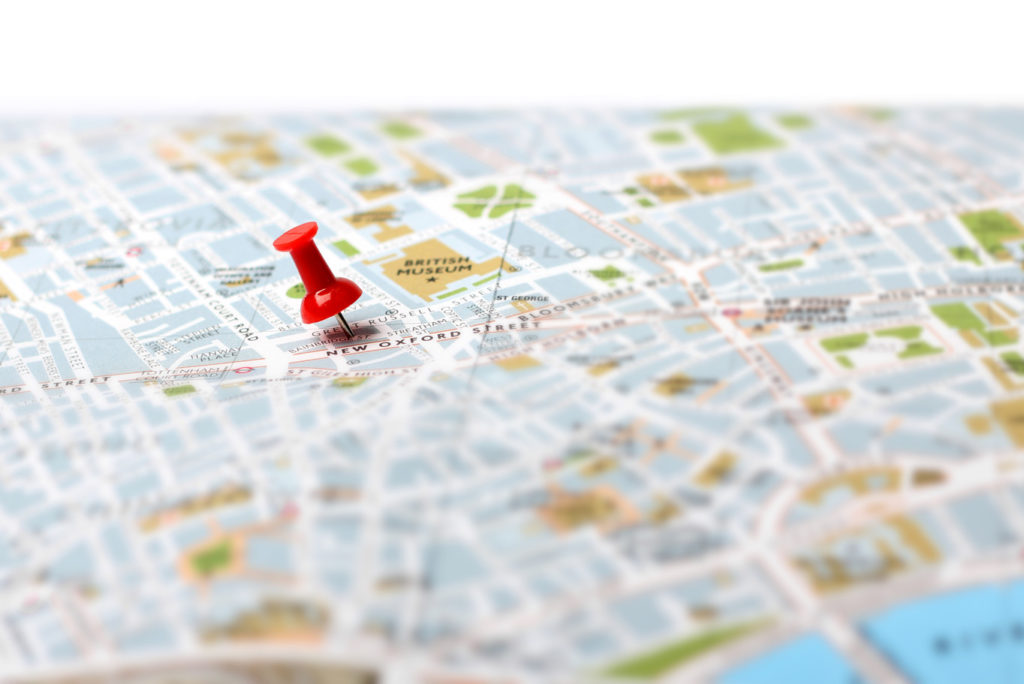
More than 40 UK towns and cities, including Birmingham, London and Manchester, have already been taking part in the government e-scooter trial rental schemes.
As of May 2021, you can hire rental scooters in the following areas:
- Bournemouth and Poole
- Buckinghamshire (Aylesbury and High Wycombe)
- Cambridge
- Cheshire West and Chester (Chester)
- Copeland (Whitehaven)
- Derby
- Essex (Basildon, Chelmsford, Colchester and Clacton)
- Gloucestershire (Cheltenham and Gloucester)
- Great Yarmouth
- Kent (Canterbury)
- Liverpool
- Milton Keynes
- Newcastle
- North and West Northamptonshire (Northampton, Kettering, Corby and Wellingborough)
- North Devon (Barnstaple)
- North Lincolnshire (Scunthorpe)
- Norwich
- Nottingham
- Oxfordshire (Oxford)
- Redditch
- Rochdale
- Salford
- Slough
- Solent (Isle of Wight, Portsmouth and Southampton)
- Somerset West (Taunton)
- South Somerset (Yeovil, Chard and Crewkerne)
- Staffordshire (Stafford and Newcastle-Under-Lyme)
- Sunderland
- Tees Valley (Hartlepool and Middlesbrough)
- West Midlands (Birmingham, Coventry and Sandwell)
- West of England Combined Authority (Bristol and Bath)
- York
- London (City of London, Ealing, Hammersmith and Fulham, Kensington and Chelsea, Richmond upon Thames, Lambeth, Southwark, Tower Hamlets, Westminister)
Most Electric Scooter Accidents Are Caused By Irresponsible Riders. In General, Electric Scooters Are A Safe Form Of Transportation.
Other important rules and information
- E-scooter rentals should only be used within the local area hosting the trial
- You must be aged 18 and over
- E-scooters should be used by one person at a time
- You must not tow anything using an e-scooter
- You must not use a mobile phone when using an e-scooter
- You may use a screen to display navigation information, but this must be set up before setting off
- Always ensure bags and other small items you are carrying will not cause danger to you or those around you
- You should not ride an e-scooter while drunk or otherwise intoxicated – you may be prosecuted
- You should also refer to the terms of use of the e-scooter operator before renting
- Hire charges to vary, but on average it costs £1 to unlock an e-scooter (using a smartphone app) plus a fee of 14p-20p per minute

